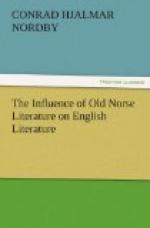We have said that the Laxdaela Saga is famous for its portrayal of character. This English version falls not at all below the original in this quality. The lines already quoted show Gudrun and Kiartan as to exterior. But this is a drama of flesh and blood creations, and they are men and women that move through it, not puppets. Souls are laid bare here, in quivering, pulsating agony. The tremendous figure of this story is not Kiartan, nor Gudrun, nor Refna, but Bodli, and certainly English narrative poetry has no second creation like to him. The mind reverts to Shakespeare to find fit companionship for Bodli in poetry, and to George Eliot and Thomas Hardy in prose. The suggestion of Shakespearean qualities in George Eliot has been made by several great critics, among them Edmond Scherer;[31] in Hardy and Morris, here, we find the same soul-searching powers. These writers have created sufferers of titanic greatness, and in the presence of their tragedies we are dumb.
An English artist has made Napoleon’s voyage on H.M.S. Bellerophon to his prison-isle a picture that the memory refuses to forget. The picture of Bodli as he sails back to Iceland, which, though his home, is to be his prison and his death, is no less impressive:
Fair goes the ship that beareth
out Christ’s truth
Mingled of hope, of sorrow,
and of ruth,
And on the prow Bodli the
Christian stands,
Sunk deep in thought of all
the many lands
The world holds, and the folk
that dwell therein,
And wondering why that grief
and rage and sin
Was ever wrought; but wondering
most of all
Why such wild passion on his
heart should fall.
(P. 294.)
Here we have the poet’s conception—and the sagaman’s—of Bodli—a man in the grip of terrible Fate, who can no more swerve from the paths she marks out for him than he can add a cubit to his stature. The Greek tragedy embodies this idea, and Old Norse literature is full of it. Thomas Hardy gives it later in his contemporary novels. We sympathize with Bodli’s fate because his agony is so terrible, and we call him the most striking figure in this story. But the others suffer, too, Gudrun, Kiartan, Refna; they make a stand against their woe, and utter brave words in the face of it. Only Bodli floats downward with the tide, unresisting. Guest prophesies bitter things for Gudrun, but adds:
Be merry yet! these things
shall not be all
That unto thee in this thy
life shall fall.
(P. 254.)
And Gudrun takes heart. When Thurid tells her brother Kiartan that Gudrun has married another, his joy is shivered into atoms before him. But he can say, even then:
Now is this world clean changed
for me
In this last minute, yet indeed
I see
That still it will go on for
all my pain;
Come then, my sister, let
us back again;
I must meet folk, and face
the life beyond,
And, as I may, walk ’neath
the dreadful bond
Of ugly pain—such
men our fathers were,
Not lightly bowed by any weight
of care.




